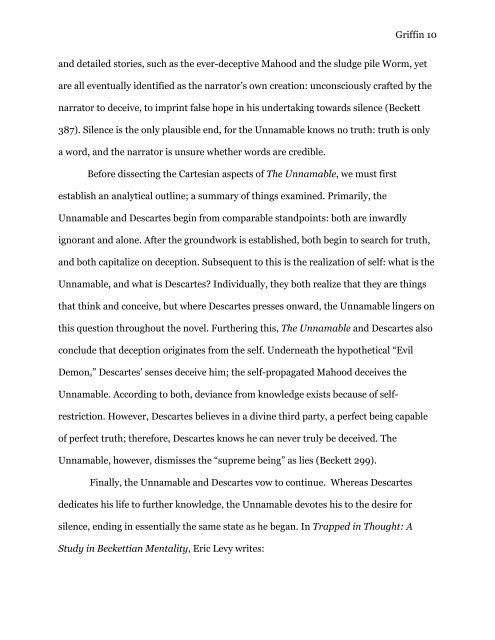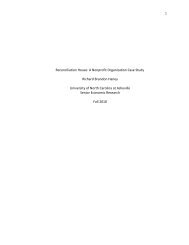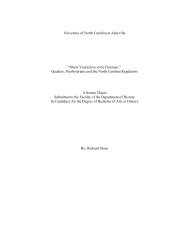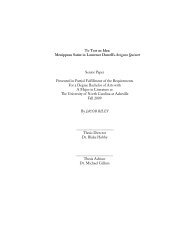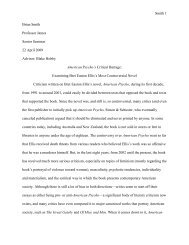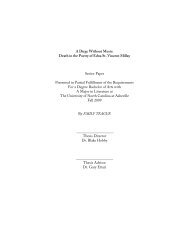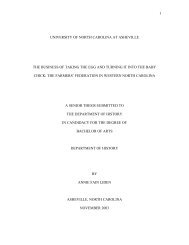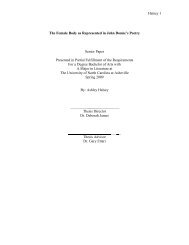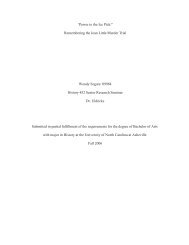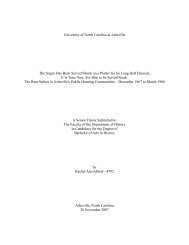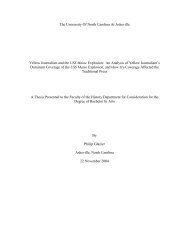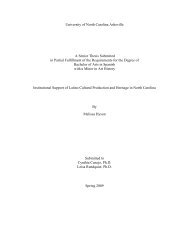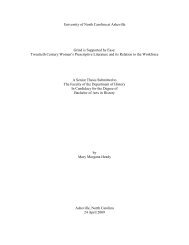Cartesian Thought in Samuel Beckett's The Unnamable
Cartesian Thought in Samuel Beckett's The Unnamable
Cartesian Thought in Samuel Beckett's The Unnamable
- No tags were found...
You also want an ePaper? Increase the reach of your titles
YUMPU automatically turns print PDFs into web optimized ePapers that Google loves.
Griff<strong>in</strong> 10and detailed stories, such as the ever-deceptive Mahood and the sludge pile Worm, yetare all eventually identified as the narrator’s own creation: unconsciously crafted by thenarrator to deceive, to impr<strong>in</strong>t false hope <strong>in</strong> his undertak<strong>in</strong>g towards silence (Beckett387). Silence is the only plausible end, for the <strong>Unnamable</strong> knows no truth: truth is onlya word, and the narrator is unsure whether words are credible.Before dissect<strong>in</strong>g the <strong>Cartesian</strong> aspects of <strong>The</strong> <strong>Unnamable</strong>, we must firstestablish an analytical outl<strong>in</strong>e; a summary of th<strong>in</strong>gs exam<strong>in</strong>ed. Primarily, the<strong>Unnamable</strong> and Descartes beg<strong>in</strong> from comparable standpo<strong>in</strong>ts: both are <strong>in</strong>wardlyignorant and alone. After the groundwork is established, both beg<strong>in</strong> to search for truth,and both capitalize on deception. Subsequent to this is the realization of self: what is the<strong>Unnamable</strong>, and what is Descartes? Individually, they both realize that they are th<strong>in</strong>gsthat th<strong>in</strong>k and conceive, but where Descartes presses onward, the <strong>Unnamable</strong> l<strong>in</strong>gers onthis question throughout the novel. Further<strong>in</strong>g this, <strong>The</strong> <strong>Unnamable</strong> and Descartes alsoconclude that deception orig<strong>in</strong>ates from the self. Underneath the hypothetical “EvilDemon,” Descartes’ senses deceive him; the self-propagated Mahood deceives the<strong>Unnamable</strong>. Accord<strong>in</strong>g to both, deviance from knowledge exists because of selfrestriction.However, Descartes believes <strong>in</strong> a div<strong>in</strong>e third party, a perfect be<strong>in</strong>g capableof perfect truth; therefore, Descartes knows he can never truly be deceived. <strong>The</strong><strong>Unnamable</strong>, however, dismisses the “supreme be<strong>in</strong>g” as lies (Beckett 299).F<strong>in</strong>ally, the <strong>Unnamable</strong> and Descartes vow to cont<strong>in</strong>ue. Whereas Descartesdedicates his life to further knowledge, the <strong>Unnamable</strong> devotes his to the desire forsilence, end<strong>in</strong>g <strong>in</strong> essentially the same state as he began. In Trapped <strong>in</strong> <strong>Thought</strong>: AStudy <strong>in</strong> Beckettian Mentality, Eric Levy writes:


